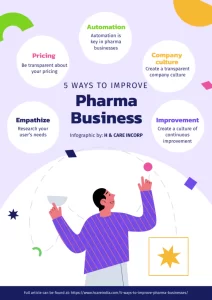- Best PCD Pharma Franchise Company
- +91 9216295095
- hcareindia@gmail.com
5 Ways to Improve Pharma Businesses
Pharmaceutical Marketing Company for Budding Marketers

Role of PCD Pharma Distributors in the Pharma Industry
Table of Contents
Toggle5 Ways To Improve Pharma Businesses
Pharma businesses are difficult. They’re often cutthroat, high-stress and all around difficult. However, that doesn’t mean they can’t be improved upon. If you have a great team, solid processes and an eye for detail, there is plenty you could do to make your business even better. By implementing these cutting-edge strategies, you can transform your pharma business and boost competitiveness.
Pharma businesses are the cornerstone of any commercial organization. They are responsible for bringing new products to market and generating revenue for the company. However, working in a field with such high demands can be overwhelming at times.
Further, there are so many different ways to improve your organization as a whole. Here, we’ll discuss 5 effective ways that you can implement in order to develop your company and become a more efficient, streamlined operation.

1. Optimize drug pricing strategies
Learn to navigate complex pricing models, value-based contracts and payer negotiations to ensure fair access to medications while maintaining profitability.
If you have a price list, great. Now take it one step further. Do you have a price list that includes the cost of time? Yes, if you have a pharma company and have a method of calculating time, include that. Transparency is key.
You may be hiding something, if you can’t be transparent about your pricing and how your company charges for its services. Alternatively, you may not be transparent about your pricing because you simply don’t know how to be. In either case, your customers will notice that and be less pleased.
2. Automation is key
There is one thing that you need to do in order to improve your company. You need to automate as many processes as possible. If you’re manually processing invoices, sending emails and performing other manual tasks, you’re doing your company a disservice. You’re going to make mistakes and be inefficient. You’re also going to get behind.
Automating as many processes as possible will help you stay on top of your game. You won’t have time to mess up and make excuses. Automating as many processes as possible will help you improve your business, your team and your individual performance.
3. Use data analytics and digital health tools
Explore how implementing cutting-edge technologies like AI, IoT and blockchain in your pharma business can revolutionize your operations, enhance efficiency and drive growth.
One way pharma businesses can leverage technology is by using data analytics to improve drug development and patient outcomes. By analyzing large datasets, companies can gain insights into disease pathways, patient populations and treatment efficacy, which can inform R & D and clinical trial design.
Another way to leverage technology is by using digital health tools to improve patient engagement and adherence. For example, Novartis had “New Year Resolution for COPD” that helps patients manage their chronic obstructive pulmonary disease (COPD) by providing education, tracking symptoms and connecting patients with healthcare providers.
To implement this strategy, pharma businesses should invest in data analytics and digital health tools. They should also partner with other companies or startups that have expertise in these areas.
4. Optimize supply chain management
Discover the latest tools and techniques to streamline your supply chain, reduce costs, minimize errors and ensure timely delivery of pharmaceutical products to customers.
Company culture can make or break your business. It’s important to remember that it is a reflection of your company. If you have built a solid foundation, you’re in a better position than most. However, that doesn’t mean that you have to rest on your laurels.
5. Foster collaboration with healthcare professionals
Explore strategies to foster stronger partnerships with healthcare professionals, such as physicians, pharmacists and nurses, to enhance patient referrals, medication adherence and overall customer satisfaction. Innovative collaborations with startups, research institutions and technology companies to use their expertise will drive innovation in your pharma business.
Case studies of successful pharma businesses
To illustrate these strategies in action, let’s take a closer look at some successful pharma companies:
Roche
Roche is a Swiss multinational healthcare company that specializes in the development of pharmaceuticals and diagnostics. The company has a strong focus on personalized medicine, leveraging genomic data to develop targeted therapies for cancer and other diseases.
Roche has also invested heavily in digital health, developing a range of tools and platforms that improve patient outcomes and engagement. For example, the company has developed a patient portal called “MyRoche” that allows patients to access information about their treatment and connect with healthcare providers.
Pfizer
Pfizer is a multinational pharmaceutical company that specializes in the development of vaccines, oncology and rare disease therapies. The company has a strong presence in both developed and emerging markets, with a broad range of products that address different therapeutic areas and patient populations.
Pfizer has also focused on diversifying its product portfolio, exploring new therapeutic areas and market segments to capture new growth opportunities. The company has also invested in R & D, developing several blockbuster drugs.
So, to conclude, if you’re having pharma businesses, there is one thing that you need to do in order to improve your company. You need to automate as many processes as possible. It’s a cliché but it’s true.


